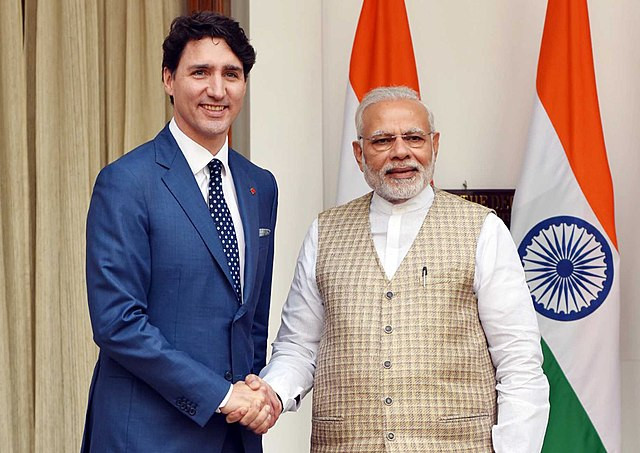Tensions between India and Canada have escalated once again, following Ottawa's recent decision to identify India's ambassador to Canada, Sanjay Kumar Verma, as a "person of interest" in its investigation into the killing of Sikh separatist leader Hardeep Singh Nijjar. The move has drawn sharp criticism from New Delhi, which dismissed the allegations as politically motivated, labeling them as part of Canadian Prime Minister Justin Trudeau's "vote bank politics" and an effort to gain domestic political support.
India's Ministry of External Affairs responded strongly to the allegations, rejecting what it called "preposterous imputations" and claiming that Canada has yet to present any evidence linking Indian officials to the assassination. "Since Prime Minister Trudeau made certain allegations in September 2023, the Canadian government has not shared a shred of evidence with the Government of India, despite many requests from our side," the ministry said in a statement. The Indian government emphasized that it believes the accusations are part of a deliberate strategy by the Trudeau administration to malign India for political gains.
Relations between the two countries, which have been deteriorating since the fall of 2023, reached a new low following Trudeau's initial claim that Indian agents were involved in Nijjar's assassination. Nijjar, who was labeled a terrorist by India for his involvement in the Khalistan separatist movement, was killed in June 2023 in British Columbia. Canada, home to a large Sikh population, has become a focal point for the global Khalistan movement, which advocates for the creation of an independent Sikh state in India's Punjab region.
India's foreign ministry went a step further in its statement, alleging that Trudeau's government had given space to "violent extremists and terrorists" who harass Indian diplomats and community leaders in Canada. This accusation follows India's repeated frustrations over Canada's handling of Sikh separatist activities within its borders.
Amid the deepening diplomatic rift, India summoned Canada's Deputy High Commissioner to India, Stewart Wheeler, seeking clarification on Ottawa's latest move. This came just hours after India's strongly-worded rejection of the claims surrounding the involvement of Indian diplomats in the ongoing investigation. The confrontation follows Canada's withdrawal of more than 40 diplomats from India in October, following a demand from New Delhi to significantly reduce its diplomatic footprint in the country.
Trudeau, meanwhile, has continued to call on India to engage with Canadian authorities and assist in the investigation. "We hope that India will engage with us so that we can get to the bottom of this very serious matter," Trudeau said in a statement earlier this year. However, India has remained steadfast in denying any role in the assassination and has repeatedly asked Canada to provide evidence to substantiate its claims.
Further complicating matters, the United States has also raised concerns about India's alleged involvement in assassination plots against Sikh separatists. In 2023, U.S. authorities indicted an Indian national accused of participating in a failed assassination attempt on another Sikh separatist leader in New York. While India has expressed concern over the incident, it has refrained from the kind of heated response seen in its dealings with Canada, opting instead to open its own investigation into the matter.
Despite the growing tensions, Canada has yet to produce any concrete evidence to support its allegations, fueling accusations from Indian officials that Trudeau is using the issue to win favor with Sikh voters ahead of future elections. The Canadian Prime Minister's political standing among the country's large Sikh community, a key constituency in certain regions, has led to speculation that his focus on the Nijjar case is influenced by domestic electoral considerations.
The ongoing diplomatic spat has broader implications for both countries. Canada and India have historically enjoyed a strong bilateral relationship, with trade ties and people-to-people exchanges strengthening over the years. However, the latest accusations threaten to strain those ties even further. Moreover, Canada's ongoing investigations into the killings of Sikh separatists, coupled with its growing concerns about foreign interference from both India and China, highlight the delicate balance it faces in maintaining relations with key international partners while addressing domestic security concerns.




